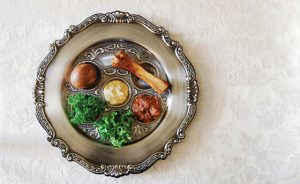 Passover is one of the most widely celebrated Jewish holidays. Yet, “Recent studies show that 70 percent of Jews celebrate this ritualized re-telling of the Exodus story, far more than the 53 percent who observe Yom Kippur, or the 39 percent who are members of a synagogue,” writes Elissa Strauss in The Week.
Passover is one of the most widely celebrated Jewish holidays. Yet, “Recent studies show that 70 percent of Jews celebrate this ritualized re-telling of the Exodus story, far more than the 53 percent who observe Yom Kippur, or the 39 percent who are members of a synagogue,” writes Elissa Strauss in The Week.
So why, in this age of lack of affiliation and significant number of Jews jettisoning so much of Jewish tradition, do so many still cling to some form of a Passover Seder? “Even as Jews have grown estranged from their religion, the Passover Seder beckons to them to return home,” writes Rabbi David Orlofsky, of Ohr Somayach International. Why is this ceremony observed more than everything else?
Of course there is the food and the nostalgia that comes with it. And then there is the storytelling. The meal unfolds around an epic tale, of heroes and villains, fearsome events and miraculous outcomes and, of course, the escape of the Israelites from slavery to freedom. We eat symbolic foods and drink four cups of wine, while reclining on pillows (literally or metaphorically) to celebrate our freedom.
“But perhaps the real secret to Passover’s success,” says Strauss, “lies not in its fixed parts, but those open to interpretation.” People are always finding new and creative ways to tell this story.
But on a deeper level, “Passover conveys five major concepts that became our mantras for how to lead successful and productive lives,” says Rabbi Benjamin Blech. He believes that “they are the five most important things to know about Passover, and that they “are our greatest contributions to the world and can be summarized in five words: memory, optimism, faith, family and responsibility.”
First is the importance of memory. “Remember that you were strangers in the land of Egypt.” “Remember that G-d took you out of the bondage of slavery.” We are mandated to remember our past.
“Only by being aware of our past as a people can our lives become filled with purpose and meaning,” asserts Blech. “Memory links our past to our future. It turns history into destiny.”
To study Passover, is also to recognize how optimism has played in our history. As slaves, the Israelites had no hope. “They had become so habituated to their status as slaves without hope,” said Blech, “they could never improve their lot. The most difficult task Moses had to perform was not to get the Jews out of Egypt, but to get Egypt out of the Jews”
It was the vision of Moses leading his people to the Promised Land that inspired Martin Luther King to embrace that optimism—an optimism that he urged upon his followers in their quest for equal rights—the second gift we have given to the world.
The importance of faith, also played out in the Passover story, is the third gift. Faith in the Divine is a concept many modern Jews have a problem with. But the story of Passover teaches us that we must continue to believe that as we move forward in history, if we have faith in the possibilities before us, we can play an important role and prevail.
Faith gives us the hope that, whatever our present-day problems may be, history moves in a positive direction. That is what has always motivated us to believe in progress and to participate in tikkun olam, efforts to improve the world.
Passover teaches us yet another major truth—the importance of family. Rabbi Yaakov Menken points out that “the entire focus of the Seder is to bring the family together, each generation teaching the next—grandparents, parents and children. This creates powerful memories in the impressionable minds of our children, which they then wish to re-create in later years.”
And finally we come to the fifth concept: the importance of responsibility to others. This becomes, for many, one of the most significant aspects of Passover that has always been a major draw for many. “We were slaves in Egypt, says Blech, “and so we have to have empathy for the downtrodden in every generation. We were slaves in Egypt—and so we have to be concerned with the rights of the strangers, the homeless and the impoverished. We experienced oppression—and so we must understand more than anyone else the pain of the oppressed.”
This history and understanding of suffering, formed a people committed to justice and to righting the wrongs of the world. We begin the Seder by inviting the hungry and the homeless to join us.
It is our faith, regardless of what happens, the strength of our families, our dedication to memory and undying optimism, that fuels our commitment to our community. Perhaps this explains why millions of Jews will join together at the Seder table for the three thousand three hundred and twelfth time and why, wherever we are, we always show up for Passover.
Florence L. Dann, a fifth year rabbinical student at the Academy for Jewish Religion in LA has been a contributing writer to Jlife since 2004.






